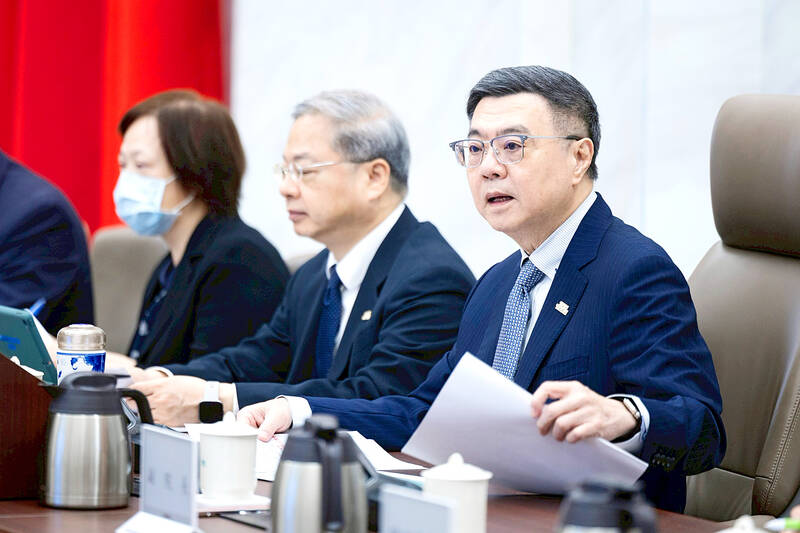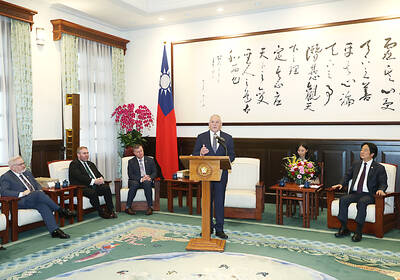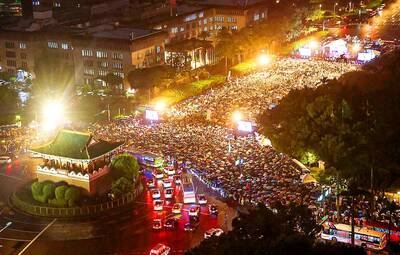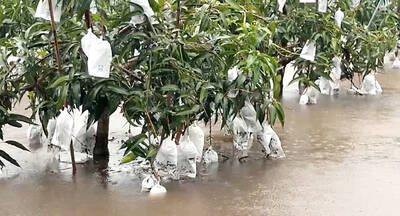The Executive Yuan yesterday approved a bill aimed at establishing a foundation in Taiwan to facilitate youth development and encourage greater youth participation in public affairs.
The draft youth basic act, pending legislative approval, seeks to provide a general legal framework and establish fundamental principles for the public sector at central and local government levels to take a “youth perspective” into account and “facilitate youth development.”
In particular, the bill would mandate central and local governments establish mechanisms for the participation of people aged 18 to 35 when developing policies, regulations and programs.

Photo courtesy of the Executive Yuan.
Under the bill, the central government would be required to release a “youth policy white paper” and update it every four years based on national development goals and societal needs.
Chen I-tsung (諶亦聰), deputy head of the Ministry of Education’s (MOE) Youth Development Administration, told a Cabinet press briefing yesterday that the first white paper would be drafted as soon as February next year.
The Executive Yuan would establish a board convened by the premier and tasked with formulating youth policy and coordinating efforts to implement youth-related measures, the bill says.

Photo: Chen Yu-fu, Taipei Times
In related news, the MOE announced phase two of the “Taiwan Global Pathfinders Initiative” is open for applications, offering 625 spots in 100 cases for young people to study performance arts in Seoul, artificial intelligence (AI)-related industries in Germany, or the aerospace industry in France.
The program, first launched by the Executive Yuan in November last year, aims to provide Taiwanese with more opportunities to pursue their dreams.
The ministry continued the program this year, budgeting NT$10 billion (US$312.3 million) over the next four years, with an emphasis on people aged 15 to 30, Chen said.
The program this year is divided into two phases; the first saw 54 approved out of 296 applicants, and assisted another 157 to participate in the program, Chen said.
The second phase involves providing 652 spots for young people through a selection of programs, such as performance arts in Seoul and precision mechanics or AI-related industries, targeting students aged 15 to 17, she said.
Another program, allowing individuals to learn or intern at companies in the French aerospace industry, would be made available to people aged 18 to 30, she added.
Meanwhile, the amended Article 17 of the Income Tax Act (所得稅法) states that since last year, the special deduction for preschool children is relaxed and applicable to children aged six or under, with the rates going up to NT$150,000 for the firstborn, and NT$225,000 for each child after the first, Chen said.
The amended Article 36-2 of the Act for Development of Small and Medium Enterprises (中小企業發展條例) allows companies to file for a 200 percent wage deduction if they hire Taiwanese aged 24 or under, or 65 or above, Chen said.
The same amendment also saw wage-increase expense deduction rates increase from 130 percent to 175 percent for baseline employees, encouraging small and medium-sized enterprises to offer higher wages and retain talent, Chen said.
As per President William Lai’s (賴清德) directives, the government has provided up to 620,000 spots for affordable education as of March, and is also providing childcare, childraising, and education subsidies, she said.
Starting last year, more than 90 percent of publicly funded childcare facilities have provided after-hours services and additional childcare services during the winter and summer vacation periods for an extra fee, averaging NT$35 per hour for after-hours services and NT$2,000 per month during the winter and summer vacations, Chen said.
Since August last year, 54 public and non-profit kindergartens have also provided a trial program of providing short-term child care services, she added.

‘NON-RED’: Taiwan and Ireland should work together to foster a values-driven, democratic economic system, leveraging their complementary industries, Lai said President William Lai (賴清德) yesterday expressed hopes for closer ties between Taiwan and Ireland, and that both countries could collaborate to create a values-driven, democracy-centered economic system. He made the remarks while meeting with an Irish cross-party parliamentary delegation visiting Taiwan. The delegation, led by John McGuinness, deputy speaker of the Irish house of representatives, known as the Dail, includes Irish lawmakers Malcolm Byrne, Barry Ward, Ken O’Flynn and Teresa Costello. McGuinness, who chairs the Ireland-Taiwan Parliamentary Friendship Association, is a friend of Taiwan, and under his leadership, the association’s influence has grown over the past few years, Lai said. Ireland is

A saleswoman, surnamed Chen (陳), earlier this month was handed an 18-month prison term for embezzling more than 2,000 pairs of shoes while working at a department store in Tainan. The Tainan District Court convicted Chen of embezzlement in a ruling on July 7, sentencing her to prison for illegally profiting NT$7.32 million (US$248,929) at the expense of her employer. Chen was also given the opportunity to reach a financial settlement, but she declined. Chen was responsible for the sales counter of Nike shoes at Tainan’s Shinkong Mitsukoshi Zhongshan branch, where she had been employed since October 2019. She had previously worked

FINAL COUNTDOWN: About 50,000 attended a pro-recall rally yesterday, while the KMT and the TPP plan to rally against the recall votes today Democracy activists, together with arts and education representatives, yesterday organized a motorcade, while thousands gathered on Ketagalan Boulevard in Taipei in the evening in support of tomorrow’s recall votes. Recall votes for 24 Chinese Nationalist Party (KMT) lawmakers and suspended Hsinchu City mayor Ann Kao (高虹安) are to be held tomorrow, while recall votes for seven other KMT lawmakers are scheduled for Aug. 23. The afternoon motorcade was led by the Spring Breeze Culture and Arts Foundation, the Tyzen Hsiao Foundation and the Friends of Lee Teng-hui Association, and was joined by delegates from the Taiwan Statebuilding Party and the Taiwan Solidarity

TRANSPORT DISRUPTION: More than 100 ferry services were suspended due to rough seas and strong winds, and eight domestic flights were canceled, the ministry said Tropical Storm Wipha intensified slightly yesterday as it passed closest to Taiwan, dumping more than 200mm of rain in Hualien and Taitung counties, the Central Weather Administration (CWA) said. As of 11am, Wipha was about 210km southwest of Cape Oluanpi (鵝鑾鼻) and was moving west-northwest at 27km per hour (kph). The storm carried maximum sustained winds of 101kph and gusts reaching 126kph, with a 150km radius of strong winds, CWA data showed. Wipha’s outer rainbands began sweeping across Taiwan early yesterday, delivering steady rainfall in the east and scattered showers in other regions, forecasters said. More heavy rain was expected, especially in the eastern